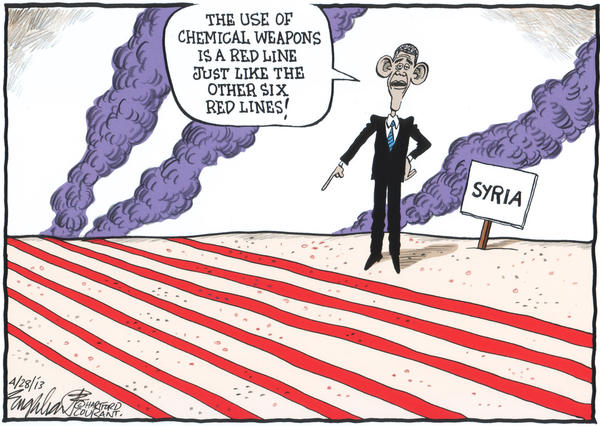Images last week of another horrific chemical weapons attack on civilians in Syria left the world shocked and many wondering; weren't Syria's chemical weapons destroyed? Turns out the U.S.' deal with Russia to wipe out Syria's stockpiles wasn't so solid, but it wasn't a total failure.
The 2014 deal
The 2014 deal
In the aftermath of a large-scale chemical attack against Syrian civilians in 2013, President Obama threatened to uphold the international ban on chemical weapons by taking military action against the Syrian government with targeted strikes.
Congress wasn't thrilled about the idea of military strikes, and in the end, the U.S. worked with Russia to broker a deal in 2014 to work with an international body to destroy Syria's chemical weapons stocks.
In his 2014 State of the Union address, Obama touted the deal as a major success.
"American diplomacy, backed by the threat of force, is why Syria's chemical weapons are being eliminated," he said.
Later that year, then-Secretary of State John Kerry also claimed victory.
"We struck a deal where got 100 percent of the chemical weapons out," he said in an interview on NBC's "Meet the Press."
A risky deal?
Last week's chemical attack suggest that not all of Syria's chemical weapons were destroyed, or that new ones were created since 2014.
Now former Obama administration officials say the deal wasn't so solid.
"We always knew we had not gotten everything, that the Syrians had not been fully forthcoming in their declaration," former deputy secretary of state Atony J. Blinken told the New York Times.
Dan Shapiro, a former member of Obama’s national security council said the same.
But, Obama's former deputy national security adviser, Ben Rhodes, still touted the effectiveness of the deal. In a Tuesday morning interview with NPR, he said Obama's diplomatic efforts wielded longer-term results than Trump's military action.
Rhodes said, "But if you look at diplomacy versus military action, the military action destroyed an airfield for a few hours. And there are now apparently missions being flown by the Syrian regime from that airfield. Diplomacy removed over a thousand tons of chemical weapons and had them destroyed. So I would argue that there was a greater effect from the diplomatic agreement than from that airstrike."
So why make the deal?
So why make the deal?
If the administration suspected Syria would cheat on the chemical weapons deal, why make it? Experts say it's probably because a deal to get rid of most of Syria's chemical stockpile would bode better than an escalated military conflict. Not to mention Congress wasn't completely on board with air strikes against the Assad regime.
"I’m assuming, but this is an assumption, that their calculus was that the net benefit would be greater for the United States and for the Syrian people," said Barry Pavel, who served as the special assistant to the President and senior director for defense policy and strategy on the National Security Council (NSC) staff during the Bush and Obama administrations.


No comments:
Post a Comment